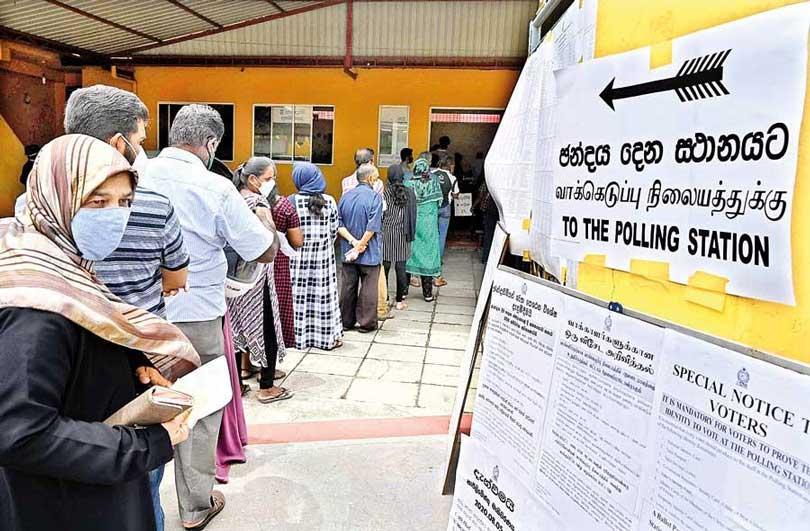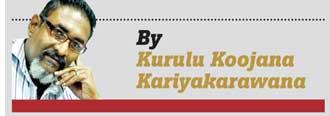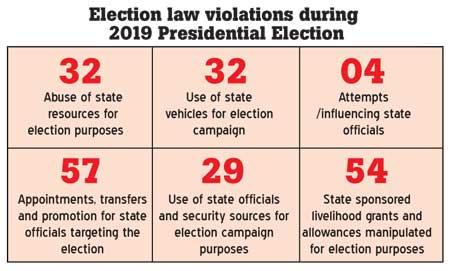Reply To:
Name - Reply Comment

Even weeks prior to the announcement of the Presidential election on July 26th and campaigning commencing, various forms of election law violations had taken place across the country
Another strategy governments use during elections is to expedite work on development projects
 In a short span of four years Sri Lanka has survived a destructive global pandemic and an intolerable economic downturn, which resulted in a historic public uprising that toppled a government and ousted a president.
In a short span of four years Sri Lanka has survived a destructive global pandemic and an intolerable economic downturn, which resulted in a historic public uprising that toppled a government and ousted a president.
Once again the country is faced with a major election to appoint its president before the end of this week and chances are high that the newly elected president would dissolve the Parliament and call for a general election soon after. The leading political parties or alliances that were armed  to the teeth with their campaigns concluded the final round of rallies on Wednesday adhering to the 48-hour silent period. The public is yet again put to the ultimate test to elect their ruler before a dangling carrot of promises.
to the teeth with their campaigns concluded the final round of rallies on Wednesday adhering to the 48-hour silent period. The public is yet again put to the ultimate test to elect their ruler before a dangling carrot of promises.
Even weeks prior to the announcement of the Presidential election on July 26th and campaigning commencing, various forms of election law violations had taken place across the country. Although incidents of election related violence were comparatively less this time, issues related to misinformation on social media, partisan reporting on mainstream media and the abuse of state resources were growing at a steady phase. The Election Commission of Sri Lanka (ECSL)  and independent election monitoring bodies have a major task on their shoulders to keep a tab on election law violations to ensure free and fair elections, which in other terms assure good governance of a country.
and independent election monitoring bodies have a major task on their shoulders to keep a tab on election law violations to ensure free and fair elections, which in other terms assure good governance of a country.
From July 31st to September 18th the ECSL received 4, 945 election related complaints from across the country of which 4, 804 were complaints related to the violation of the election law. There were 34 election violence complaints and 107 complaints fall into the other category. Local independent election monitoring agencies such as PAFFREL, TISL and CaFFE have been conducting surveys on the complaints and also gathering data on electoral and general law violations.
The People’s Action for Free and Fair Election (PAFFREL) by Monday received 1, 360 complaints and incidents in relation to both electoral law and general law violations. Of the total number of complaints 1, 082 cases were on election law violations while 205 were on the misuse of state power, resources and employees.
The Campaign for Free and Fair Elections (CaFFE) received 896 complaints related to violation of election law and instances of election violence countrywide up to the last weekend. According to its Executive Director Manas Makeen the misuse of state resources is far greater than the complaints of election law violations and unlawful campaigning.
Transparency International Sri Lanka (TISL) by the end of the last week had received 758 complaints concerning the misuse of public resources for election campaigning. From this the largest category of complaints, which is 343 pertains to the misuse of public premises. These include the misuse of public grounds, government offices, buildings and schools for election campaigns.
Speaking at a recent media briefing TISL’s Executive Director Nadishani Perera expressed deep concern over the rampant misuse of public resources reported during the Presidential Election 2024. The TISL urged the ECSL to take immediate and decisive action to halt these violations and uphold the integrity of the election process.
The TISL had identified alarming instances where government vehicles, including those of the Sri Lanka Transport Board (SLTB) and the Sri Lanka Air Force (SLAF) have been used for election campaigning. They have also filed Right to Information (RTI) requests with relevant authorities to seek details and transparency on the use of these public resources.
Public officers
According to Perera, reports have surfaced on public officers, including those in senior positions who do not have political rights, actively campaigning for political parties both in person and on social media. The TISL has lodged complaints with the ECSL and the respective heads of institutions, calling for the reconsideration of deploying such officers for election duties.
Executive Director for People’s Action for Free and Fair Election (PAFFREL) Rohana Hettiarachchi opined the abuse of state resources could happen in any election depending on the type of election and the amount of power held by ruling parties. In a local government election the powers of the executive, the parliament and the provincial councils will be influenced. In a provincial council election the powers of the executive cum parliament could be influenced.
However, during a presidential election the advantages and the authority a ruling party has or the powers an incumbent President who is running for the next stint could exercise is far greater than any other election, Hettiarachchi pointed.
“The presidential candidate who is already in office could use the clout of the on-going mega projects implemented with funds from the country’s centralized budget to gain mileage.
These include government development projects and national polices on development. A candidate who is in office could strategically use these projects and policies to run his campaign.
No one could object to relief measures undertaken by the government during natural disasters as it is the policy of any dispensation to ensure the safety and welfare of its citizens. Can anyone object to giving concessions to low-income families during the Sinhala or Tamil New Year? It is the government policy to provide concessions to the needy.
Development projects
Another strategy governments use during elections is to expedite work on state development projects. A circular was issued a few months ago with directions to expedite all government projects before July 31st this year. Is it a bad decision to order the expedition of year-long projects before a set deadline? Even a kid would understand that since the nominations should be given in August for a presidential election to be held in October, expediting government development projects is chiefly an election targeted gimmick.
Although, it is a long process to challenge this scenario in courts and vie for a fair judgment nobody could say it’s a wrong thing to do. One can seek legal action against these moves once an election is declared. And complain beyond reasonable doubt that the particular decisions were taken politically motivated and targeting the election. But they could always bring a technical argument that these were state policies, which had been mentioned in their manifesto. Then it becomes a very tricky situation to legally prove otherwise.
There are genuine government development projects that take place for a long time and longstanding state policies to distribute relief or concessions. Although, there is no clear demarcation on this the Election Commission could decide it to be a genuine programme not targeting the elections, if it was running for a longer period. Another genuine way of conducting these state projects is to run them without the involvement of politicians but the public officials.
State lands
Distributing state lands to the needy is another move, which had been happening during the time of former President Mahinda Rajapaksa. Alleviating poverty is a progressive move but doing that DURING elections makes one to have second thoughts. Right throughout history these things have happened on politically triggered motives. The closest landmark decision on this was the judgment delivered on the distribution of ‘Sil redi’ in the run up to the 2015 Presidential Election, Hettiarachchi said.
During 2019 Presidential Election the PAFFREL recorded 204 violations (110 confirmed, 94 unconfirmed) under the category of the ‘Abuse of State Power, Resources and Misusing State Sector Employees. According to PAFFREL’s 2015 Presidential Election Final Report the number of complaints on the misuse of state resources was 452. During the 2010 Presidential Election the number of complaints was 77. There was nearly a six-fold increase in the number of violations recorded in the 2015 election compared to the 2010 polls.
There were several key issues that vitiated a level playing field during the 2015 Presidential Election and the principal issue was the grant of benefits and outright gifts to members of the public as inducements to vote in favor of the incumbent President. Also, state sector employees, especially those engaged in economic relief activities like the Samurdhi officials were deployed to campaign on behalf of the UPFA candidate. State events were also used for campaign purposes.
There were instances where local bodies controlled by the ruling party were being used to block the opposition candidate’s access to public venues for campaigning including grounds and auditoriums.
Another issue was monopolising the state media by the ruling party to give its candidate an edge. It enabled the incumbent candidate to mould public opinion and harness public support through targeted programming.
Transfer of police officers during the 2015 election campaign period was another issue, which was stopped in some cases with the intervention of the Election Commission.
Additional Commissioner Legal of the ECSL B. P. C. Kularathne elaborated on how the abuses of state resources were categorised. Under the Election Commission of Sri Lanka election related complaints are divided into two main categories. They are election related violence and violation of the election law.
The violation of the election law is divided into several main categories such as abuse of state resources, illegal display of posters and banners, misuse of media and social media, illegal conduct of processions, rallies, disturbing election related campaigns, disrupting postal voting and related complaints, unlawful assembly and etc.
The misuse of state resources is divided into sub categories such as the misuse of public resources and accordingly movable and immovable property, including vehicles, buildings, state land, public events, public funds, public servants, which have been recognised as state resources.
Kularathne said that the Commission by the powers vested in Article 104 (4) of the Constitution has the authority to prohibit the use of any movable or immovable property of the state or public corporation by any candidate, political party or independent group.
“To control such instances of abuse of state property we take various measures when an election is declared. If any vehicle belonging to a government department or corporation is misused we take them into custody and carry out duties of the Commission during the election period.
It is a well know secret that government ministers and parliamentarians use state bungalows and guest houses for weeks during an election period. When this happens the commission books such places and keep them in its custody until the elections are over,” Kularathne said.
Thus the misuse of state resources during the 2024 presidential elections has been conspicuous. As an independent commission we do our best to control this situation as the abuse of public resources has a serious impact on good governance, the Additional Commissioner said.